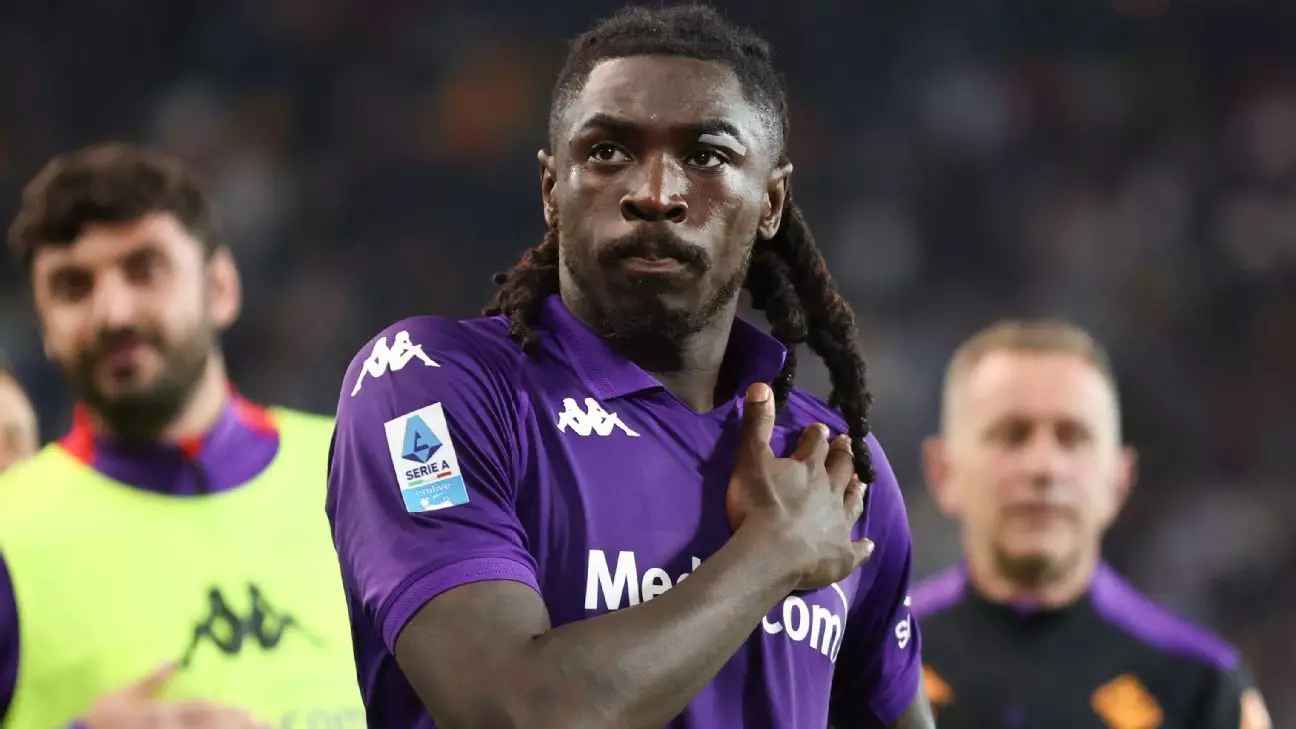Manchester United’s summer transfer strategy is currently caught in a tug-of-war between persistence and pragmatism, epitomized by their attempts to secure Bryan Mbeumo from Brentford. The club’s ambitions have been publicly met with a firm refusal after a substantial £62.5 million offer, signaling that negotiations might be reaching a stalemate. This rejection forces United to reassess their targeting—or risk being left behind as rivals solidify their squads.
In the event they fail to close the Mbeumo deal, all eyes are shifting to Moise Kean of Fiorentina. While Kean is not the initial front-runner for the United forward role, his presence on the shortlist has gained significance. Yet, the looming July 15 deadline for his £44 million release clause intensifies the urgency. This short window demands swift decision-making from United’s hierarchy, underscoring a larger challenge: balancing financial demands with tactical needs in a rapidly evolving market.
The scenario encapsulates a wider issue facing many Premier League giants: the pressure of not only identifying quality talent but also navigating club valuations and rigid transfer windows. United’s current position emits a warning—delayed actions can severely limit options and bargaining power.
Liverpool’s Savvy but Complex Defensive Gambit
Parallel to United’s offensive quandary, Liverpool is actively negotiating its own intricate deal. The Reds are exploring a swap involving their young winger Ben Doak and Crystal Palace’s esteemed defender Marc Guéhi. While Guéhi commands a steep valuation of around £50 million, Liverpool’s reluctance to meet this outright has led to creative bargaining with Doak— a player with notable potential but yet unproven at the highest level.
Liverpool’s strategy here reveals a willingness to think beyond conventional transfer fees, instead leveraging emerging talents to bridge valuation gaps. However, the risk is twofold: Doak’s departure might be a regrettable loss if his potential crystallizes, and the proposed trade still faces hurdles given the financial disparity. Additionally, the imminent exit of Jarell Quansah to Bayer Leverkusen hints at a broader squad reshuffle, complicating the long-term defensive blueprint.
This inventive negotiation model highlights Liverpool’s adaptability but simultaneously underlines the challenges clubs grapple with when financial valuations and squad planning collide.
Wider European Moves Reflect Strategic Shifts and Squad Rebuilding
Beyond England’s top clubs, the transfer landscape is undergoing noteworthy transformations across Europe. Besiktas’ near completion of Tammy Abraham’s signing from AS Roma reveals how clubs outside the traditional elite are ambitiously acquiring talent with notable Premier League experience. Abraham’s recent underwhelming stint at AC Milan doesn’t seem to have deterred Besiktas, which suggests a focus on potential resurgence rather than proven current form.
Arsenal is another club facing significant transition with Thomas Partey set to leave once his contract expires. Partey’s departure without a contract renewal signals a decisive turning point—his slow contract talks hinting at dissatisfaction or strategic divergence. Arsenal’s plan to bring in Brentford’s Christian Nørgaard suggests a direct replacement approach but also reflects the necessity of maintaining squad balance amidst exits.
Moreover, West Ham’s pursuit of Borussia Monchengladbach’s Rocco Reitz epitomizes the Premier League’s hunger for young European talent. Despite Reitz’s fresh contract and €20 million release clause, West Ham, along with Brighton and Fulham, are determined to activate their interest, spotlighting the race for emerging stars who can be cornerstone players in the upcoming seasons.
Goalkeeping Market Dynamics and Emerging Influence of Middle Eastern Clubs
The transfer maneuvering for goalkeepers also throws light on evolving market dynamics. Neom SC’s agreement with Nice over Marcin Bulka contrasts with Sunderland’s late but unsuccessful bid, underscoring the growing influence of newly ambitious clubs, particularly from the Middle East, in attracting players away from traditional European suitors. This trend emphasizes a new era where financial muscle and novel club projects increasingly disrupt established transfer expectations.
Conclusively, these developments reflect vibrant but volatile transfer markets, where clubs must continuously adapt strategies under time constraints, financial pressures, and competitive rivalries. The evolving stories of Manchester United, Liverpool, and others illustrate how the juggling act of priorities and pragmatism shapes squad building far beyond headline signings.

